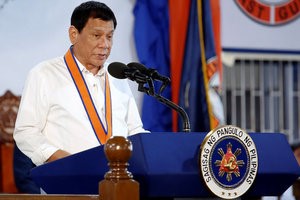MANILA (Reuters) - Philippine leader Rodrigo Duterte has issued an administrative order to create a presidential task force to protect journalists and investigate attacks on media, in what is one of the world's most dangerous countries for the press.
A special unit comprised of cabinet ministers, police, defence and justice officials would spend a month compiling an inventory of outstanding cases before pursuing investigations, said Presidential Communications Secretary Martin Andanar.
The Philippines enjoys one of the most liberal media environments in Asia, but violence against journalists is common and probes into killings are often inconclusive or hamstrung by lack of witness testimony.
"The reason why the president wanted this administrative order number 1 is because he cares for you, for us," he told a regular briefing on Thursday.
"And he believes in freedom of the press."
The order was signed by Duterte on Tuesday and includes the formation of an oversight panel to scrutinise the probes and gather input from non-governmental sources, such as human rights and journalist groups.
It would also monitor media personnel in danger and provide them with protection, Andanar said.
Scores of journalists have been killed in the Philippines in the past three decades, with many of the victims radio broadcasters, often for coverage of provincial-level politics, which is notoriously dangerous.
Thirty-one journalists were among 57 people killed in a massacre in 2009 in the southern province of Maguindanao while covering a local election, in what was one of the most deadly incidents involving media in the world.

The Committee to Protect Journalists ranks the Philippines fourth in the world in its impunity index, which tracks deaths of media members whose killers go free.